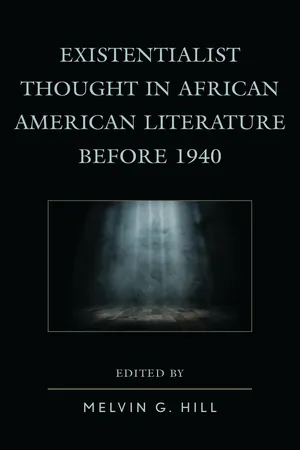
- English
- ePUB (mobile friendly)
- Available on iOS & Android
eBook - ePub
Existentialist Thought in African American Literature before 1940
About this book
Existentialist Thought in African American Literature Before 1940 is the first collection of its kind to break new ground in arguing that long before its classification by Jean-Paul Sartre, African American literature embodied existentialist thought. To make its case, this daring book dissects eight notable texts: Frederick Douglass's Narrative of the Life of Frederick Douglass (1845) and My Bondage and My Freedom (1855), Sojourner Truth's Ain't I A Woman (1861), Harriet Jacobs's Incidents in the Life of A Slave Girl (1861), Sutton E. Griggs's Imperium in Imperio (1899), James Weldon Johnson's Autobiography of an Ex-Colored Man (1912), and Nella Larsen's Quicksand (1928) and Passing (1929). It explores and addresses a wide range of complex philosophical concepts such as: authenticity, potentiality-for-authentic living, bad faith, and existentialism from the Christian point of view. The use of interdisciplinary studies such as gender studies, queer studies, Christian ethics, mixed-race studies, and existentialism, allows the authors within this book to lend unique perspectives in examining selected African American literary works.
Frequently asked questions
Yes, you can cancel anytime from the Subscription tab in your account settings on the Perlego website. Your subscription will stay active until the end of your current billing period. Learn how to cancel your subscription.
No, books cannot be downloaded as external files, such as PDFs, for use outside of Perlego. However, you can download books within the Perlego app for offline reading on mobile or tablet. Learn more here.
Perlego offers two plans: Essential and Complete
- Essential is ideal for learners and professionals who enjoy exploring a wide range of subjects. Access the Essential Library with 800,000+ trusted titles and best-sellers across business, personal growth, and the humanities. Includes unlimited reading time and Standard Read Aloud voice.
- Complete: Perfect for advanced learners and researchers needing full, unrestricted access. Unlock 1.4M+ books across hundreds of subjects, including academic and specialized titles. The Complete Plan also includes advanced features like Premium Read Aloud and Research Assistant.
We are an online textbook subscription service, where you can get access to an entire online library for less than the price of a single book per month. With over 1 million books across 1000+ topics, we’ve got you covered! Learn more here.
Look out for the read-aloud symbol on your next book to see if you can listen to it. The read-aloud tool reads text aloud for you, highlighting the text as it is being read. You can pause it, speed it up and slow it down. Learn more here.
Yes! You can use the Perlego app on both iOS or Android devices to read anytime, anywhere — even offline. Perfect for commutes or when you’re on the go.
Please note we cannot support devices running on iOS 13 and Android 7 or earlier. Learn more about using the app.
Please note we cannot support devices running on iOS 13 and Android 7 or earlier. Learn more about using the app.
Yes, you can access Existentialist Thought in African American Literature before 1940 by Melvin G. Hill in PDF and/or ePUB format, as well as other popular books in Literature & Historical Literary Criticism. We have over one million books available in our catalogue for you to explore.
Information
Table of contents
- Contents
- Acknowledgments
- Introduction
- Chapter 1: Morality, Art, and the Self
- Chapter 2: I’m Not Here: Existential Acts in Nineteenth-Century African American Women’s Narrative
- Chapter 3: Sutton E. Griggs’s Existential Vision in Imperium in Imperio: The New Negro
- Chapter 4: Existential Authenticity in Early Twentieth-Century African American Passing Narratives
- Chapter 5: “Clare Kendry Cared Nothing for the Race. She Only Belonged to It”
- About the Contributors